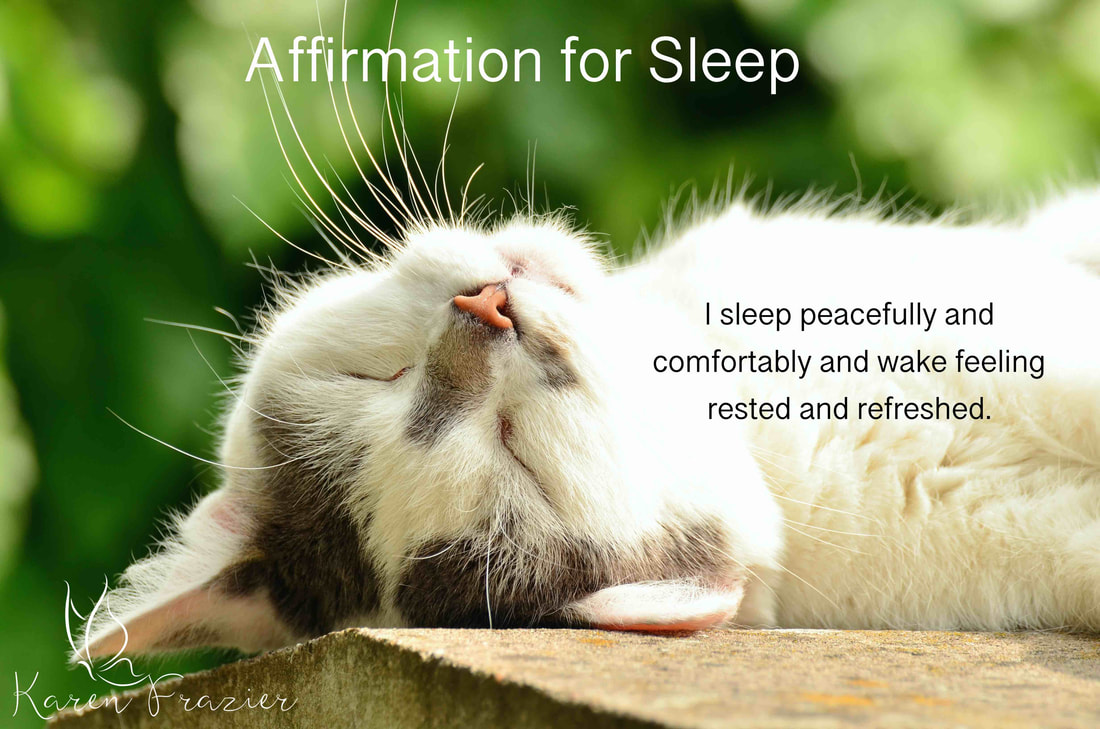|
For most of my life, I've believed I was someone who didn't sleep well. In fact, that belief was so strong I often found myself awake in the middle of the night, sitting up and wishing I could be asleep. When social media became a thing, I noticed something curious; there were lots of other people who were sitting up in the middle of the night all over the world feeling exactly as I did - that sleep would never be something they did well.
Then, I started to pay attention to how I thought and spoke about sleep, and what my expectations were surrounding sleep. I noticed I frequently told people I suffered from insomnia. I also noticed my thoughts before bed each night included things like, "Oh gosh - I hope I don't have insomnia tonight," or, "Hopefully tonight my sleep won't be disturbed." The universe supported the thoughts by making them creations. I tossed and turned. I suffered hip pain that woke me frequently. The universe even sent me a little dog (who I dearly love) that woke me up several times a night for seven years. The universe wasn't being perverse or mean. It was supporting what I believed about my sleep. Once I understood this and noticed my own thoughts, beliefs, and behaviors, I was already halfway to a better night of sleep. First came the behavioral issue with the little dog. I consulted with animal communicator Karen Anderson who reminded me my beliefs about what my dog, Monkey, was going to do each night (wake me up multiple times) was part of the reason for Monkey's behavior, and she kindly suggested I change that expectation. She also communicated with Monkey and gave me some tools for dealing with behavioral slips and within a few days, the behavior had ended. It has not returned, nor do I expect it will because once I realized that behavior was in large part driven by my expectations, I was able to change the way I thought about it until my expectations changed, and then I was able to change my experience. I also started to change my thoughts about the quality of my sleep, which also led to a change in my expectations. Every time I noticed myself slipping into my beliefs about insomnia or hoping I didn't sleep poorly, I paused for a moment, visualized myself sleeping well and waking refreshed, and repeated the affirmation, "I sleep peacefully and comfortably and wake refreshed." I now use this affirmation every night before I go to sleep, as well as throughout the day if I notice any of my old thought patterns about sleep creeping in. One of the things I've found is along with sleeping better in general, I've noticed I am less likely to be awakened by aches and pains (such as persistent hip pain I've experienced for several years) throughout the night. Now I'm working on changing my thoughts, beliefs, and the story I tell about that hip pain, but that's another blog for another day. Right now we're focusing on sleep. Other Solutions (Metaphysical & Physical) I also implemented some metaphysical solutions, which serve as a reminder that the focus of my thoughts need to be on peaceful sleep. They also create an energetic vibration that is more supportive of peaceful and restful sleep.
Your Better Sleep Program
With some attention to your thoughts, habits, and environments, it's possible to reprogram yourself to sleep peacefully so you won't have to sit up all night with other insomniacs on social media. Image by congerdesign from Pixabay
1 Comment
Traci
11/10/2017 05:22:05 am
Thank you for this! While I do practice most of this, it's my thoughts on sleep that are hanging me up. I will try to reconstruct to a more positive way of thinking. Often times I believe you write just for me ❤
Reply
Leave a Reply. |
Categories
All
Archives
December 2022
|
AUTHOR KAREN FRAZIER
- Home
-
Books
- Angel Numbers for Beginners
- Avalanche of Spirits
- Chakra Crystals
- Complete Reiki
- Crystal Alchemist
- Crystals for Beginners
- Crystals for Healing
- Dancing with the Afterlife
- Dream Interpretation Handbook
- Essential Crystal Meditation
- Higher Vibes Toolbox
- Introduction to Crystal Grids
- Little Book of Energy Healing Techniques
- Noisy Ghosts
- Reiki Healing for Beginners
- Transform Your Life with Alchemy
- Ultimate Guide to Psychic Ability
- Usui Ryoho Reiki Manual
- Cookbooks
- Other Books
- Classes
- Connect
- Meditate

 RSS Feed
RSS Feed
